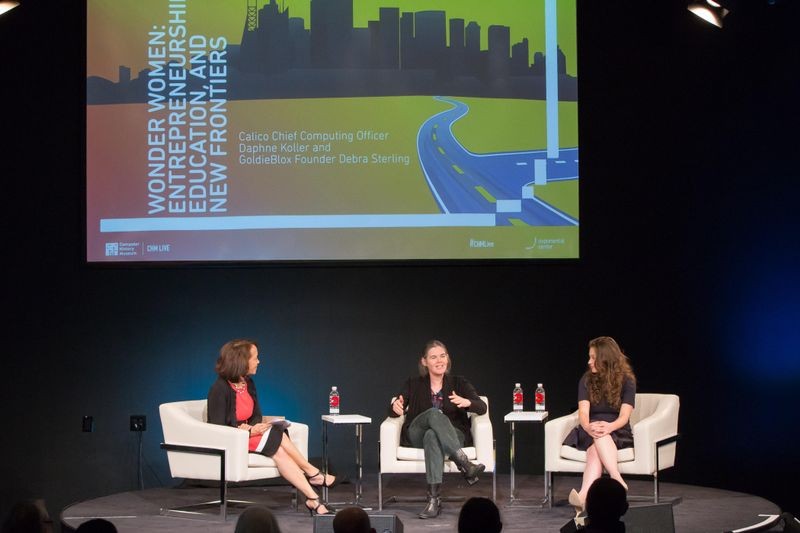

“Wonder Women: Entrepreneurship, Education, and New Frontiers—Calico Chief Computing Officer Daphne Koller and GoldieBlox Founder Debra Sterling in Conversation with the Exponential Center’s Marguerite Gong Hancock,” November 7, 2017. Produced by CHM Live and the Exponential Center at the Computer History Museum.
It takes both vision and commitment to see that expanding educational opportunities today will make a better future and then to create a company to do just that. Calico Chief Computing Officer and Coursera cofounder and cochair Daphne Koller and GoldieBlox founder and CEO Debra Sterling have done it. In a panel produced by CHM Live and the Exponential Center at the Computer History Museum (CHM) on November 7, Koller and Sterling candidly discuss the challenges and rewards of creating their businesses from the ground-up and offer advice to new entrepreneurs—particularly women.
Research professor Daphne Koller had been teaching at Stanford University for 18 years when in 2009−2010 she began to feel that some students were not receiving the best learning experiences in more crowded classes. She and her colleague, Andrew Ng, decided to try a flipped-classroom approach, providing material for students online so that in-person class time could be devoted to interactive instruction. The online course turned out to be, in her words, “pretty good,” and they thought it would be nice to offer it to people outside of Stanford who didn’t have access to that kind of material.
Remarkably, hundreds of thousands of people of all ages and all socioeconomic groups from all over the world signed up. It was then that Koller realized she “couldn’t not do it”—that is, take a leave of absence and found Coursera to bring online courses from other top universities to even more students.
Daphne Koller talks about why she had to found Coursera in “Wonder Women: Entrepreneurship, Education, and New Frontiers.”
A graduate of Stanford engineering, Debra Sterling became “obsessed,” she says, with encouraging young girls to become interested in science, technology, math, and engineering (STEM) through play. When a friend described her frustration that there were so few women in engineering and attributed her own interest to playing with her brother’s construction toys when she was a child, it resonated with Sterling. She had often been the only girl in her science and engineering classes and knew what it was like to feel out of place. A trip to the local toy store where the girls’ toys—princesses and fairies and dolls—literally turned the aisle pink started her on a crusade to create fun building and “making” toys for girls.
When she took her prototype toy and the first girl-engineer character to a toy industry tradeshow in New York, Sterling almost lost faith in her idea. But her roots in the entrepreneurial ecosystem of the San Francisco Bay Area helped turn things around.
Debra Sterling talks about the myth that girls don’t like construction toys in “Wonder Women: Entrepreneurship, Education, and New Frontiers.”
Both Sterling and Koller agree that it was unlikely they would have been able to build successful startups outside of Silicon Valley. In addition to the talent attracted by Stanford, Berkeley, and other local universities, the culture of innovation and the presence of investors, startup advisors, and other entrepreneurs in the area were critical in helping them navigate the first few years and the challenges of scaling. Furthermore, they both had to learn how to establish an effective leadership team and build a company culture. Sterling sought out an executive coach to help her become a better CEO, and Koller wishes she had realized earlier that she couldn’t figure it all out by herself through an academic approach.
Passionate advocates of expanding educational opportunities outside traditional boundaries, Koller and Sterling provide interesting perspectives on gender disparities. Koller notes that 40 percent of girls worldwide do not have access to education beyond the age of 10 or so. Fueled by her own experiences in engineering and researching for GoldieBlox, Sterling points out that only 14 percent of engineers in the United States are women, less than 25 percent of college graduates in STEM fields are women, and girls start to lose confidence in those subject areas as early as age 8. Both panelists discuss the challenges they’ve faced as women in tech and offer their advice for female entrepreneurs. Koller recounts “little things” about gender discrimination in tech that “aren’t so little.”
Daphne Koller describes how she handles men taking her ideas in meetings. Navigating sexism is difficult, Koller remarks. Women have to walk a fine line between being too passive and getting ignored and being perceived as “overly-aggressive.”
Debra Sterling talks about her experiences not being taken seriously in engineering and as an entrepreneur, as well as VCs’ bias toward men.
The world is already a different place due to the efforts of Koller and Sterling. Their companies have literally reached millions and they’re just getting started. Continuing her interest in improving lives, Koller is now working in the next big data frontier. At Calico, she hopes to gain insights from biological data to promote healthy aging. Sterling is creating stories with GoldieBlox and her friends on YouTube, where every day they’re inspiring more and more kids . . . and adults.
“Wonder Women: Entrepreneurship, Education, and New Frontiers—Calico Chief Computing Officer Daphne Koller and GoldieBlox Founder Debra Sterling in Conversation with the Exponential Center’s Marguerite Gong Hancock,” November 7, 2017. Produced by CHM Live and the Exponential Center at the Computer History Museum.
The Exponential Center captures the legacy—and advances the future—of entrepreneurship and innovation in Silicon Valley and around the world. The center explores the people, companies, and communities that are transforming the human experience through technology innovation, economic value creation, and social impact. Our mission: to inform, influence, and inspire the next generation of innovators, entrepreneurs, and leaders changing the world.